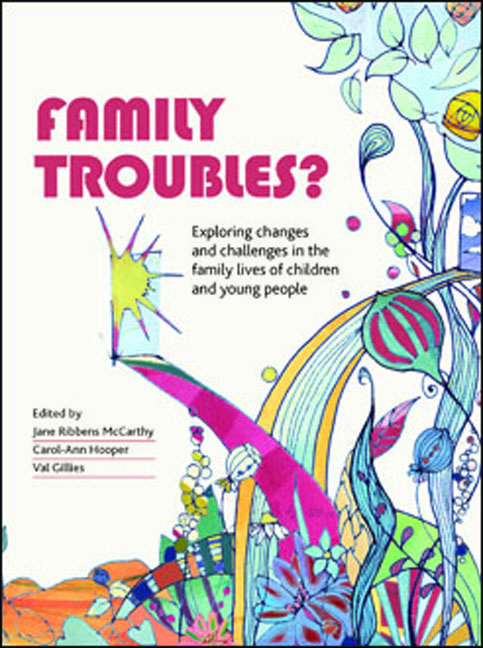Book contents
- Frontmatter
- Contents
- Notes on contributors
- Foreword
- Preface
- 1 Troubling normalities and normal family troubles: diversities, experiences and tensions
- Part One Approaching family troubles ? Contexts and methodologies :Introduction to Part One
- Part Two Whose trouble ? Conteste d definitions and practice: Introduction to Part Two
- Part Three The Normal, The Troubling And The Harmful?: Introduction to Part Three
- Part Four Troubles and transitions across space and culture: Introduction to Part Four
- Part Five Working With Families: Introduction to Part Five
- Index
17 - Colombian families dealing with parents’ international migration
Published online by Cambridge University Press: 07 September 2022
- Frontmatter
- Contents
- Notes on contributors
- Foreword
- Preface
- 1 Troubling normalities and normal family troubles: diversities, experiences and tensions
- Part One Approaching family troubles ? Contexts and methodologies :Introduction to Part One
- Part Two Whose trouble ? Conteste d definitions and practice: Introduction to Part Two
- Part Three The Normal, The Troubling And The Harmful?: Introduction to Part Three
- Part Four Troubles and transitions across space and culture: Introduction to Part Four
- Part Five Working With Families: Introduction to Part Five
- Index
Summary
Introduction
International parental migration is perceived in diverse and contradictory ways by different family members, whose experiences of what is ‘normal’ and ‘troubling’ are shaped by both local cultural traditions and global social and economic forces. This chapter, based on fieldwork conducted in four cities in Colombia, raises issues about pain as a ‘normal’ experience of families living in circumstances of separation related to migration; both parents and children assume that pain is the normal price they have to pay for succeeding, searching for a better life and economic progress. Yet, there are differences in their narratives: while parents focus on their role as providers, children focus on the experience of separation. It points to the impact of wider attitudes, for example, as manifested through the media, and an ideological clash between the desirability of a nuclear family household and how a particular version of (affluent) childhood is meant to happen, and what parents can do when they are unable to meet both of these ideals.
The family members’ voices talk about diverse and sometimes contradictory and troubling experiences. While most children perceive separation as a sad and stressful experience that, with time, they become used to, some remain angry and resentful for a long time. Beyond their economic role, both parents and children assign remittances a broader meaning as an emotional bond; thus, the failure of the parent in sending remittances is often a factor in determining feelings of abandonment and resentment in the child. There are also gender differences around the perception of troubles and normality for the parent who migrates.
Children and international parental migration
Children are actors in global processes (Stephens, 1995; Scheper-Hughes and Sargent, 1998); like other family members, they are agents in migratory practices and experiences, albeit within generational and gendered hierarchies of family power. In their interactions with parents, siblings, peers, carers and other relatives, they construct cultural and personal realities; they face change, separation and suffering through various kinds of personal and social trouble. In doing so, they also have expectations about, and enjoy some of the benefits of, migration. In the international context, they can migrate with their families, stay in the country of origin or migrate independently (Whitehead and Hashim, 2005); they can also be returnees (Potter, 2005).
- Type
- Chapter
- Information
- Family Troubles?Exploring Changes and Challenges in the Family Lives of Children and Young People, pp. 209 - 222Publisher: Bristol University PressPrint publication year: 2013



